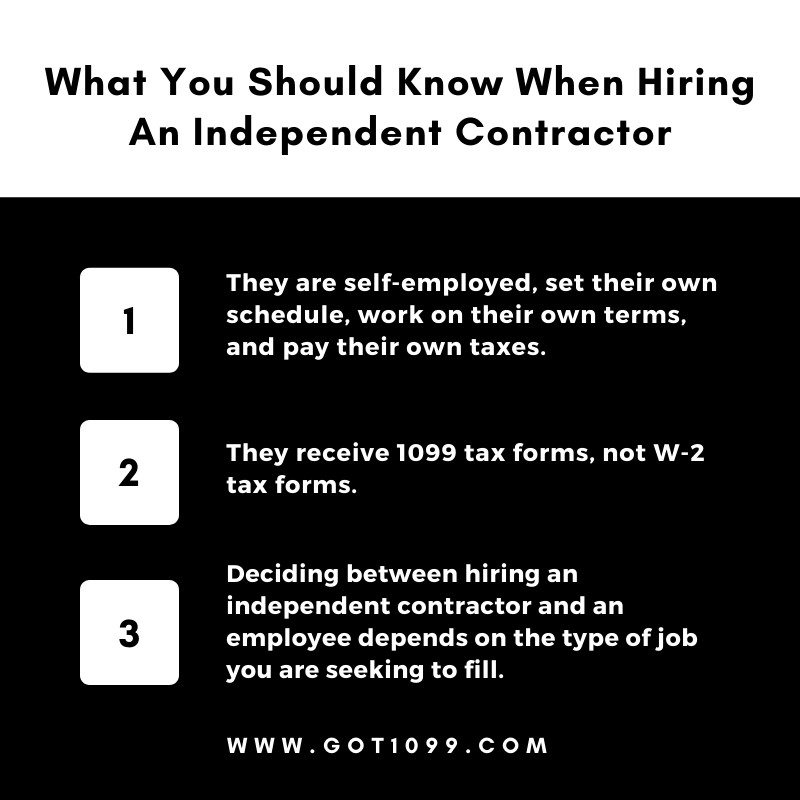What is an independent contractor?
An independent contractor, also known as a gig worker, is hired on a contractual basis by an employer for a specific job. This could be to build a patio deck, to install flooring, and much more. These contractors are hired for an agreed-upon job, can work for multiple employers simultaneously, and overall have more work independence.
Key indicators that qualify independent contractor classifications include:
- They are self-employed
- They set their own schedule
- They have their own tools
- They set their own salary
- They can deny work
- They work on projects on their own terms
- They pay their own taxes
Payments made to independent contractors are not pre-taxed and rest on the shoulders of the contractor to set aside the right funds to pay their taxes in full. This means payroll taxes typically split between employers and employees for Social Security and Medicare do not apply to independent contractors. They must pay those taxes themselves.
Employees on the other hand are hired long-term for an employer. There are more regulations surrounding their duties, hours, and payroll taxes.
What is the difference between an independent contractor and an employee?
Their differences lie in a couple factors including:
- Behavioral control– how much and what type of instruction can the employer instruct the employee.
- Financial control– to what extent does the employer control the finances of the employee.
- Relationship– The relationship between a business and a worker is dependent on how the worker and business perceive their interaction with one another.
Employees
When it comes to behavioral control, employees are told when and where to work, are given evaluations throughout the year, are given instructions, and training.
The employer also has more financial control over an employee. Laptops, computers, and other work-related equipment are typically provided by the employer. Employees are set up with payroll and have their payments pre-taxed, and they usually work for one employer. When filing taxes, their forms are W-2s.
Relationally, employers provide healthcare benefits, vacation time, and retirement plans for employees. Their employment comes with the understanding that the employer is hired indefinitely in their role for the company.
Independent Contractors
Behavioral control for independent contractors is a more hands-off process than it is for employees. They have less structure on the degree of instruction on how to complete the job, are evaluated on the final product of the job, not throughout the job, and are already well versed on how to complete the project.
Unlike employees, independent contractors must provide their own equipment and are not reimbursed for work expenses. They receive a flat fee payment instead of regular paychecks and can work for multiple employers simultaneously. Their tax filings are reported on 1099 forms instead of W2 forms.
The relationship between independent contractors and employers is set up through the contract both parties agree on. It outlines the parameters of the job, the approximate length of time the job should take, and the expectations of everyone involved. They are not given the benefits or employment permanence that employees have.
How do I know if I should Hire an Independent Contractor?
Deciding between hiring an independent contractor and a full-time employee depends on the type of job you as an employer are seeking to fill. Consider the behavioral control, financial control, and relationship differences between workers and employees when making the decision on which to hire.
If your business needs someone to answer phone calls every day during usual work hours, you might want to consider hiring an employee. They would work for your company indefinitely, you have the ability to train them specifically for your company. However, if your business is looking to update the entryway of the office building, you might want to consider an independent contractor for that particular job.
Hiring an independent contractor may be more beneficial for your business because they require less hands-on work, have easier payment methods, and can perform specific job functions based on a contractual agreement.
Correctly Classify Workers and Employees
Businesses hiring employees or workers must ensure that each is correctly classified. If Employment Development Department (EDD) flags your business for an audit and they find any of your employees or workers misclassified, it can lead to major fines, penalties, or even jail time.
If you classify your workers with our reports, and EDD audits your business, you can use our organized reporting system to verify that you indeed did classify all of your workers correctly.
Our got1099 report includes:
- 1099 Business verification
- Business entity status
- Tax License checks
- EIN Confirmation
- Website research
- Professional license alerts
- Full staff support
Using our reporting system can find any incorrect classifications so that you can rectify the misclassification before an audit. Contact our team today to classify your workers and verify they are correctly classified as an independent contractor.

LOCATION
La Jolla, CA 92037
o: (888) got-1099 (468-1099)
e: contact@got1099.com
copyright got1099®
copyright got1099?®
copyright Start1099®
GET AB-5 And CASLB Updates in your inbox
IMPORTANT INFO
Disclaimer
got1099 is a business reporting company providing business analysis reports to companies re: their 1099 independent contractors We do not provide legal advice. Consult with your attorney relating to any legal issues.


